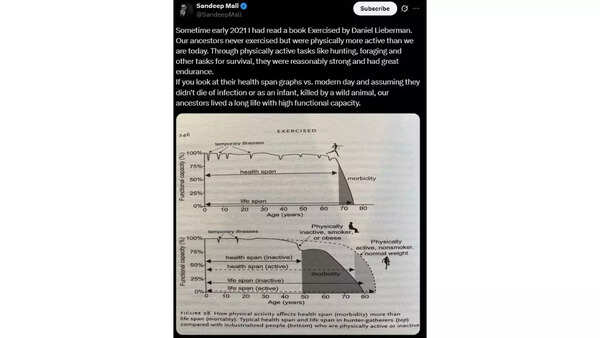Harvard research reveals: How a simple 21-minute walk a day may be healthier than hitting the treadmill
In an era dominated by intense workout trends, fitness challenges, and often misunderstood wellness goals, a Harvard evolutionary biologist is challenging conventional wisdom. Dr. Daniel E. Lieberman argues that the human body evolved to conserve energy, not to endure the extreme physical demands of modern fitness culture.

Exercise: A Modern Anomaly?
Lieberman suggests that what we consider "exercise" today is a recent phenomenon. Our ancestors engaged in physical activity primarily for survival – hunting, foraging, building, and migrating. "We have to do this weird thing called exercise, which is voluntary physical activity for the sake of health and fitness—something nobody did until very recently," Lieberman explains.
This perspective highlights that while exercise is beneficial, humans are biologically predisposed to conserve energy.
Lieberman emphasizes that our bodies are designed to store energy, a crucial adaptation for survival in environments where food was scarce. This explains why many find it challenging to maintain workout motivation; our bodies are naturally inclined to avoid unnecessary exertion.

The Power of Walking
Lieberman posits that walking is the most natural and evolutionarily consistent form of exercise. Early humans walked vast distances out of necessity. Today, incorporating walking into our daily routines – such as walking to the bus stop, taking the stairs, or strolling during lunch breaks – aligns more closely with our biological makeup than high-intensity workouts.
The 21-Minute Formula
Lieberman critiques the notion that fitness success requires suffering. He advocates for moderation and sustainability. Research indicates that just 150 minutes of moderate activity per week, or approximately 21 minutes a day, can reduce the risk of early death by 30%. He encourages consistent movement in enjoyable ways, emphasizing the significant benefits of small, sustainable habits.

The Pitfalls of Overtraining
Lieberman cautions against the dangers of overtraining and burnout, often fueled by social media and modern fitness trends. He stresses that an excessive focus on peak performance can lead to injuries and demotivation, particularly among young people striving for unrealistic ideals.
"The obsession with optimum performance is overrated," he states. "High performance is just achieving your goals and staying active—it doesn’t need to mean winning medals." He urges a shift towards prioritizing function and longevity over aesthetics or performance metrics.
Is it Okay to Skip a Workout?
Lieberman's evolutionary perspective provides a reassuring answer: rest is not failure; it's biological wisdom. He encourages a balanced approach – regular movement without obsession. Understanding our evolutionary roots can liberate us from harmful fitness narratives, allowing us to embrace a sustainable and guilt-free approach to health.
Dr. Daniel Lieberman's research offers a compelling argument for rethinking our approach to physical activity. Effective exercise doesn't require extremes. Consistency, moderate movement, and enjoyment are the keys to long-term health. Embracing walking, prioritizing rest, and listening to our bodies may be the most natural and beneficial choices we can make.
Newer articles
Older articles
-
 Google CEO Sundar Pichai’s top 5 work tips to instantly boost productivity and leadership skill
Google CEO Sundar Pichai’s top 5 work tips to instantly boost productivity and leadership skill
-
 This new AI tool can help you book train tickets, get refunds and check details on IRCTC website and app
This new AI tool can help you book train tickets, get refunds and check details on IRCTC website and app
-
 How do graphic designers convert JPG to PDF (Portable Document Format)?
How do graphic designers convert JPG to PDF (Portable Document Format)?
-
 Priyanka Chopra reveals daughter Malti Marie has started school in New York: 'Her schedule is even crazier than mine'
Priyanka Chopra reveals daughter Malti Marie has started school in New York: 'Her schedule is even crazier than mine'
-
 Mumbai’s Ravindra Sante to lead India’s mixed disability team on England tour
Mumbai’s Ravindra Sante to lead India’s mixed disability team on England tour
-
 Twitter bans over 5 lakh accounts in India, here's why
Twitter bans over 5 lakh accounts in India, here's why
-
 Microsoft plans to take on iPhone and Android smartphones with this new device
Microsoft plans to take on iPhone and Android smartphones with this new device
-
 NASA astronauts prepare ‘space sushi’ aboard the ISS in zero gravity during a heartwarming crew celebration
NASA astronauts prepare ‘space sushi’ aboard the ISS in zero gravity during a heartwarming crew celebration
-
 Elon Musk’s AI company will make Grok chatbot more accessible, here’s how
Elon Musk’s AI company will make Grok chatbot more accessible, here’s how
-
 Government issues warning for these Android smartphone and tablet users
Government issues warning for these Android smartphone and tablet users